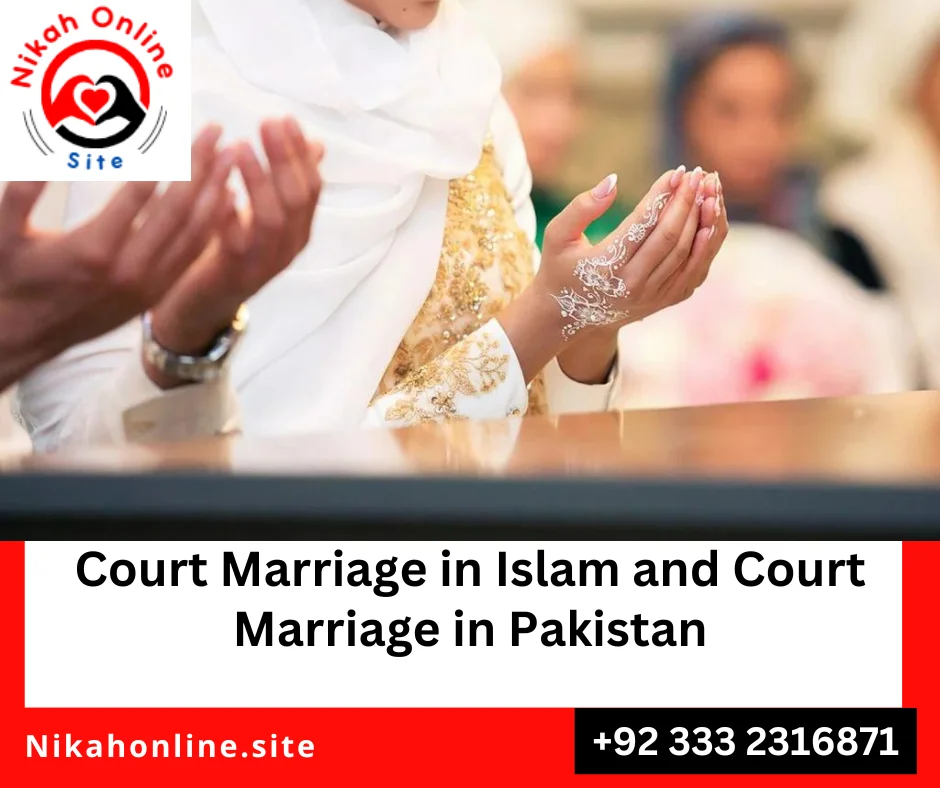Court Marriage in Islam and Court Marriage in Pakistan
Court Marriage in Islam: Balancing Legal and Religious Harmony
Court Marriage in Islam-An Introduction
Court marriage in Islam represents a unique intersection of legal statutes and religious observance. It refers to a marriage conducted under the jurisdiction of civil law, yet it simultaneously adheres to the tenets established within Islamic principles. This dual approach is essential as it caters to the needs of contemporary society while maintaining the foundational religious elements that define Muslim unions.
The significance of court marriage in modern Islamic societies cannot be overstated. As societal norms evolve, many Muslim couples are opting for court marriages in Pakistan and other regions, primarily to ensure compliance with legal structures while fulfilling religious obligations. This enhances the legal validity of their relationship in the eyes of the state, ensuring their rights and responsibilities are safeguarded. Moreover, court marriages provide an avenue for couples who may face obstacles in traditional wedding practices, such as family disapproval or logistical difficulties.
In Islam, marriage is not merely a social contract; it is a sacred bond intended to promote faith, stability, and mutual respect. The principles governing court marriage in Islam resonate with these ideals. Both parties enter into the marriage voluntarily, and it is accompanied by clear terms that outline the duties and rights of each spouse, aligning seamlessly with Islamic teachings on marital obligations. The growing acceptance of court marriage among Muslims signifies a recognition of its practicality without detracting from its religious significance.
Notably, marriage in Islam is seen as a vital component of community life, hence the increasing popularity of court marriage reflects a shift towards a more pragmatic approach that accommodates the realities of modern life while remaining faithful to Islamic doctrines. This evolution presents an opportunity for Muslim couples to engage in a union that is both legally sound and spiritually grounded.
Legal Framework for Court Marriages in Pakistan
The legal framework governing court marriage in Pakistan is multifaceted, intertwining both Islamic law and civil legal provisions. In Pakistan, the Family Courts operate under the Family Courts Act of 1964, which regulates matters related to marriage and family issues. A court marriage in Pakistan is recognized as a legal union between partners, provided they fulfill the requisite legal obligations. The primary law governing marriages in Pakistan is the Muslim Family Ordinance of 1961, which serves as a guideline for marriages conducted within the Islamic context.
To embark on the court marriage process, the couple must adhere to specific legal requirements. Firstly, both parties should be of the legal age to marry, which is generally 18 years for females and 21 years for males in Pakistan. They must also have consented to the marriage, as is crucial in Islamic marriages. A nikah nama, or marriage certificate, must be drafted and signed during the ceremony, ensuring that the marriage is recognized under Islamic law. Additionally, documentation to support identity, such as national identity cards, and proof of readiness to marry may be required for filing with the relevant court.

Once the necessary documents are collected, the couple presents them to the Family Court, where a judge reviews the case. The role of the Family Courts in court marriages is to ensure that the marriage follows Islamic law while fulfilling civil obligations. The Family Courts also have the authority to address disputes arising post-marriage, making them integral to the legal process of court marriages in Pakistan. Ensuring compliance with both religious and legal standards facilitates a harmonious integration of personal and legal recognition in marriage.
Islamic Perspective on Court Marriage
In the context of Islamic teachings, the institution of marriage holds profound significance and is regarded as a sacred contract, referred to as Nikah. This formal agreement instills mutual rights and responsibilities between the husband and wife, emphasizing not just emotional and social unions, but also religious obligations. Within this framework, court marriage in Islam emerges as a viable means for couples to solemnize their union, especially in contexts where traditional ceremonies may be impractical or unwelcome.
One of the foundational principles of any Islamic marriage is the element of consent. The marriage contract cannot be validly established without the clear and voluntary agreement of both parties involved. This consent is integral to the Islamic ethos, ensuring that both individuals enter the marriage willingly and with full awareness of its implications. Notably, this emphasis on voluntary consent in court marriages in Pakistan aligns with both Islamic teachings and contemporary legal standards. Ensuring that couples are fully informed can mitigate misunderstandings and disputes that may arise post-marriage.
Additionally, court marriage is often cloaked in misconceptions regarding its legitimacy within Islamic tradition. Some individuals erroneously believe that a court marriage lacks religious validity due to the absence of a traditional ceremony. However, Islamic jurisprudence asserts that the essence of a marriage is embodied in the contract itself rather than the manner in which it is officiated. Thus, a court marriage in Islam is inherently valid, provided that it adheres to the required conditions. In view of this, it is crucial to educate individuals about the permissibility of registering marriages through legal channels without undermining religious principles.
Through the lens of Islamic teachings, court marriages emerge not only as a contemporary solution to societal changes but also as an avenue for upholding traditional values, provided they are conducted in accordance with Islamic obligations and ethical standards.
Benefits of Choosing Court Marriage
Court marriage in Islam has emerged as a viable alternative to traditional wedding ceremonies, providing a range of benefits that couples increasingly find appealing. One of the primary advantages of court marriage in Pakistan is its simplicity. Traditional weddings often involve elaborate rituals and extensive planning, which can be overwhelming. In contrast, court marriage allows couples to formalize their union with minimal requirements, making it a straightforward process.
Efficiency is another crucial benefit associated with court marriage. The legal procedures involved are typically quick and uncomplicated, allowing couples to complete their marriage with relative ease. This expediency is particularly advantageous for those who may be under time constraints or seeking to bypass the delays often found in customary wedding arrangements.
Cost-effectiveness is a significant factor driving couples towards choosing court marriage in Islam. Traditional weddings can be financially straining, with expenses for venue, catering, and decorations quickly adding up. In contrast, court marriages incur far lower costs, as they require less expenditure on ceremonies and related festivities. This financial advantage not only benefits the couple but also eliminates the pressure to meet societal expectations of grandeur.
Legal protection is a vital aspect of court marriage that cannot be overlooked. By opting for a legally recognized marriage certificate, couples secure their rights and responsibilities under the law. This legal documentation provides evidence of the marital relationship, safeguarding the interests of both parties in various circumstances, such as inheritance, property rights, and custody issues.
Lastly, court marriages help individuals navigate the social pressures often tied to conventional weddings. In many cultures, an extravagant celebration can overshadow the significance of the union itself. By choosing a court marriage, couples can prioritize their commitment to each other over societal expectations, allowing for a more personal and heartfelt start to their life together.


Challenges Faced in Court Marriages
Couples considering court marriage in Islam often encounter multiple challenges that can impede their journey toward legal union. One of the primary hurdles is the societal stigma attached to court marriages, especially within more traditional communities in Pakistan. Many individuals view this method of marriage as unconventional or lacking in the appropriate religious sanctity, leading to social ostracism and criticism. This negative perception can deter couples from pursuing court marriage, fearing adverse reactions from family and acquaintances.
Moreover, a significant challenge arises from the general lack of awareness regarding legal rights associated with court marriage in Pakistan. Couples may not be fully informed about their entitlements under the law, which can result in misunderstandings and complications. For instance, misunderstandings about property rights, inheritance, or even child custody can arise if individuals are not educated about the legal frameworks governing court marriages. This lack of knowledge can leave couples vulnerable, particularly in the event of disputes or issues that require legal intervention.
Family opposition is also a critical factor that can impact a couple’s decision to pursue court marriage in Islam. Often, families hold traditional views regarding marriage and may resist the idea of a court marriage, perceiving it as a rejection of cultural norms. This opposition can lead to emotional turmoil and a strain on relationships between the couple and their families.
To empower couples in overcoming these challenges, it is essential to foster open discussions about court marriage, its benefits, and legal rights. Providing access to proper legal counseling and community support can also be helpful in navigating societal attitudes. By promoting awareness and encouraging dialogue, couples can take proactive steps to address obstacles and make informed decisions about their future together.
Legal Assistance Services for Court Marriage
Court marriage in Islam represents a significant step for couples seeking to formalize their relationships in a manner that is both legally recognized and religiously compliant. However, the process can often be intricate, particularly when navigating the various legal requirements necessary in Pakistan. Therefore, obtaining legal assistance is paramount to ensure a smooth court marriage experience.
Legal consultants play a vital role in guiding couples through the nuances of the court marriage process. They provide essential services that include advising on the pertinent laws applicable in Pakistan, ensuring that all required documentation is meticulously prepared, and that statutory obligations are fulfilled. This professional support is crucial in avoiding potential pitfalls that could arise due to oversight or lack of understanding of legal formalities.
Moreover, reliance on expert legal assistance enhances the couple’s awareness of their rights within the context of court marriage in Islam. Legal advisors are equipped to explain the implications of marriage contracts, rights to inheritance, and other significant considerations that may arise post-marriage. This level of guidance becomes essential not just for compliance, but also for fostering confidence and clarity in couples as they commit to their future together.
Additionally, legal consultants can assist in addressing any disputes or concerns that might emerge during the court marriage process. They act as mediators, helping to facilitate communication between parties, ensuring that issues are resolved amicably. This support network is vital for protecting the interests of both individuals and provides reassurance throughout the legal journey.
In conclusion, involving legal assistance is an invaluable aspect of court marriage in Pakistan. It ensures that couples are well-informed, that their rights are protected, and that they navigate the legal landscape with confidence and clarity, paving the way for a harmonious marital union in accordance with Islamic principles.


Offering Court Marriage Legal Assistance in Major Cities
In Pakistan, court marriage in Islam represents a vital legal option for couples seeking to formalize their union while ensuring compliance with both religious and legal standards. Major cities such as Karachi, Lahore, and Islamabad have seen a surge in legal assistance services specifically tailored to facilitate court marriages. These services are crucial as they help couples navigate the complexities involved in the legal marriage process, ensuring adherence to Islamic principles and local laws.
In Karachi, numerous legal firms specialize in court marriage services, offering comprehensive packages that include assistance with documentation, legal representation, and guidance throughout the marriage registration process. Couples can easily access these services by contacting local legal offices or utilizing online platforms that list qualified lawyers. Lahore, too, boasts a wealth of resources, where various legal professionals provide expert advice tailored to the specific needs of couples opting for court marriage. These experts are well-versed in the marriage laws applicable in Pakistan, ensuring that every step taken by the couple is lawful and recognized by the system.
Islamabad, being the country’s capital, offers a unique advantage as numerous legal offices are centrally located, facilitating easy access for couples in need of help with their court marriage in Islam. Many of these offices also feature special promotional packages designed to make the process more affordable for couples, particularly those from underprivileged backgrounds. These packages often include not just legal assistance but also counseling services to address any concerns or questions about the marriage process, making the experience stress-free.
In conclusion, the availability of legal assistance for court marriage in Pakistan’s major cities significantly enhances the experience for couples wishing to embark on this important journey. By leveraging expert legal help, they can achieve both legal recognition and religious compliance in their marriage.
Testimonials and Success Stories
Court marriage in Islam has become a beacon of hope for many couples seeking a harmonious blend of religious and legal recognition of their union. Countless individuals have embarked on this journey and emerged with positive experiences that highlight the benefits of court marriage in Pakistan, where tradition meets modernity.
One such couple, Ahmed and Sara, shared their story of a successful court marriage that allowed them to honor their faith while also adhering to the legal framework. After facing resistance from their families due to caste differences, they opted for court marriage as a means to overcome societal barriers. “It felt liberating to choose our path,” Ahmed recounted. “The legal process gave us the assurance we needed to move forward with our lives, and the support from legal assistance services made it seamless.” Their story emphasizes how court marriage can empower couples to make choices in alignment with both their religious beliefs and personal aspirations.
Another inspiring testimony comes from Fatima and Bilal, who were apprehensive about the perception of court marriage within their community. However, they discovered that their decision to marry through legal channels reinforced their commitment to each other. “We were pleasantly surprised by the positive feedback from friends and family once they understood our reasons,” Fatima explained. Their experience illustrates how initiating a court marriage in Islam can facilitate acceptance and support from loved ones, beyond the initial concerns.
These testimonials underscore that court marriage is not merely a legal procedure, but a transformative experience that can foster understanding and acceptance among diverse communities. By sharing their stories, Ahmed, Sara, Fatima, and Bilal inspire other couples to explore the possibilities of court marriage in Pakistan, highlighting the balance it offers between legal rights and religious values.


Conclusion: Embracing Legal and Religious Harmony
The discussion surrounding court marriage in Islam is pivotal for couples who seek to uphold both their religious values and legal rights. It is essential to recognize that court marriage in Pakistan serves as a significant pathway for individuals who wish to formalize their union while adhering to Islamic tenets. The integration of legal and religious components in this context fosters an environment where personal freedom is respected, and the sanctity of marriage is upheld.
Understanding the dual nature of court marriage is crucial for contemporary couples. It provides a legal framework that protects individual rights, ensuring both partners are safeguarded by the law. This protection is particularly relevant in a society where legal disputes may arise, thereby enhancing the security of the marital relationship. Couples who opt for court marriage in Islam are not only honoring their commitment to each other but also aligning their matrimonial intentions with the requirements of Islamic law.
Moreover, engaging in court marriage empowers individuals, allowing them to make informed decisions regarding their lives. This process reinforces the notion that marriage can be a source of stability and mutual respect, rather than merely a traditional obligation. By choosing this route, couples openly express their intentions, thereby preventing future misunderstandings or conflicts. As such, it is encouraged that individuals contemplating marriage consider the significance of court marriage, as it can effectively bridge the gap between legal mandates and religious commitments.
In essence, embracing court marriage in Islam offers couples the rare opportunity to appreciate both their spiritual beliefs and civil rights. This balanced approach not only respects Islamic principles but also promotes a more harmonious and equitable society.
